KYIV, Ukraine—When the guitarist for Deep Purple hit those epic opening notes of “Smoke on the Water,” my 54-year-old Ukrainian father-in-law grabbed me by the shoulder with one hand, pumped his other in a fist, and yelled a drawn out “da!”
No translation needed.
The crowd in the Kyiv sports hall was going wild. The snarl of the guitars and the bass of the drums bored through my chest. I, too, couldn’t help but pump my fist in the air and cheer.
“Rock is the music that thrills people’s minds,” my father-in-law, whose name is Valeriy Deriy, tells me months later over Thanksgiving dinner. “When you hear your favorite music that loud, you feel euphoria.”
Deep Purple was the first rock group Valeriy ever saw in concert, and I won’t lie, it was a pretty epic night. A milestone moment in our relationship in which all barriers of age, language, and culture crumbled before our mutual love of rock music.
After his first rock concert, Valeriy was hooked. So on Nov. 11, he returned to Kyiv with his older brother Sergiy to see another classic rock band, Scorpions, in concert.
My wife Lilya and I weren’t in town at the time, but we were thrilled to open up our apartment for the fraternal getaway. I left a bottle of Wild Turkey bourbon on the kitchen counter as a gift.
“Rock on,” I wrote in an attached note.
The Scorpions concert coincided with Sergiy’s 57th birthday. And, notably, it was the first time my uncle-in-law had returned to Kyiv since 1991, when he’d left the capital city out of fear of radioactive fallout from the nearby Chernobyl nuclear power plant.
Sergiy says he felt a “powerful impulse of happiness” on his return to Kyiv.
Valeriy, who began listening to Scorpions music when he was in 10th grade, says he never would have imagined, back in his Soviet youth, that one day he’d see the band in concert.
Needless to say, the Scorpions concert last month was a lifelong dream come true for the two Deriy brothers. But it represented something more, too. Something I’ve just come to understand. It was also a symbol of how far they, and their country, have come.
Rock On
As young men growing up under the Soviet Union’s communist regime, Valeriy and Sergiy fell in love with rock music. They devoured the music of Western groups such as Kiss, Pink Floyd, Van Halen, Led Zeppelin, Scorpions, and Deep Purple—to name only a few.
“Rock music is so different and colorful, not monotonous or boring at all,” Sergiy explains. “It gives a great boost of feelings and thoughts. You can’t be indifferent when you listen to rock.”
Sergiy, in particular, was a Beatles fanatic. In the ’70s and ’80s, the British rock group’s trademark “mop top” haircuts were all the rage in Ukraine. In fact, if someone in the Deriy brothers’ hometown of Komsomolsk could afford some American bling, such as Levi’s jeans, they were said to have “Beat-luck”—an eponymous reference to the Fab Four.
However, Western music technically was forbidden by the Soviet authorities. Contraband records, which went for about 100 Soviet rubles a piece, often were smuggled into the Soviet Union by sailors, one of the few professions that had regular contact with the outside world.
Spending about half a month’s salary on a vinyl record was a serious investment. But, for Valeriy and Sergiy, it was well worth it. They built up a sizable trove of contraband albums over the years.
“We were listening to Western bands because we didn’t have music like that,” Valeriy tells me. “I think that, because our culture came from death camps, war, and prisons, it couldn’t be so free. When we were young, we were told that those people who danced or screamed during concerts were inadequate, with demonic thoughts in their heads.”
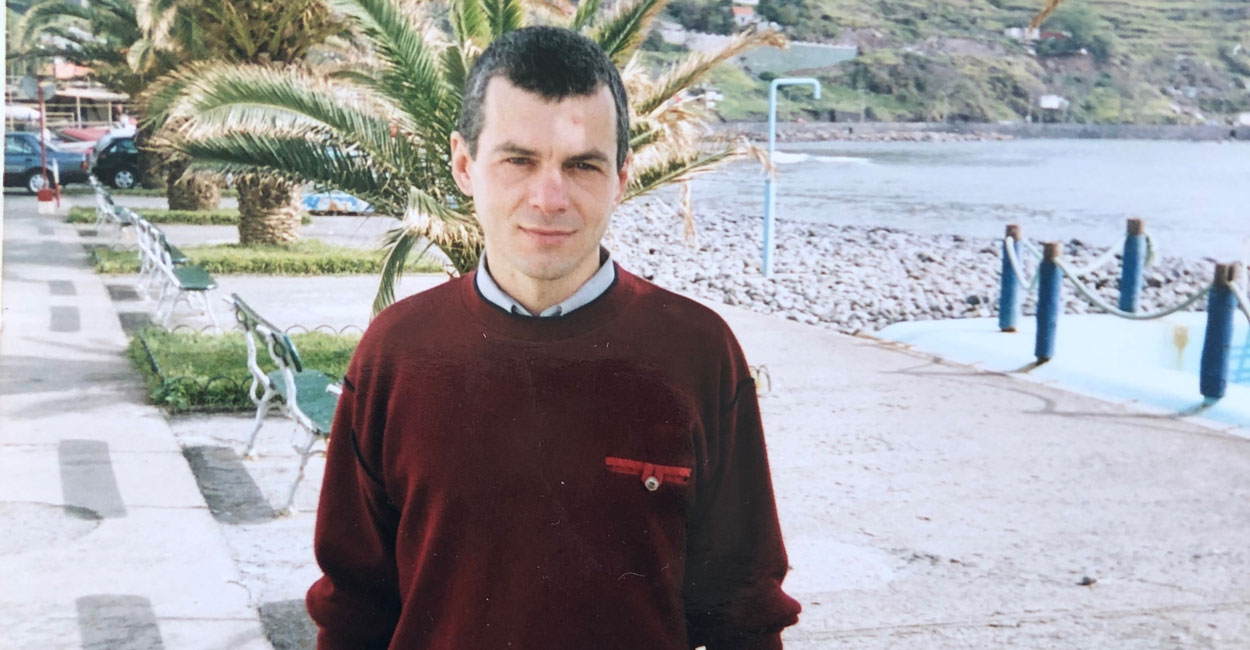
Tough Times, Tough Choices
Valeriy and Sergiy Deriy have no other siblings. Their father, Mikhail, was a construction foreman who made about 250 Soviet rubles a month, about the going price, at that time, for one pair of Levi’s jeans on the black market.
Once, their father went away for a few months of work and came back home with enough money to build his family a country cottage—a “dacha.” The leftover cash went to his two sons, who used the funds to buy what Valeriy describes as a “top of the line” Pioneer stereo system.
“It was the highest quality stereo you could find in the Soviet Union at that time,” Valeriy proudly recalls decades later.
That stereo quickly became the talk of the town. Friends and neighbors came over in droves, wanting to have a listen. And, likely, to unreservedly let loose behind closed doors to their favorite music, safely shielded from the KGB’s perpetually prying eyes.
Valeriy says that, according to the letter of Soviet law, he and his brother could have gone to jail for “two or three years” if the KGB had caught them with their illegal record collection.
Even though the law wasn’t strictly enforced, listening to Western music, rock in particular, definitely was frowned upon. And being on the KGB’s blacklist was never a good thing.
“Performing the way the Western rock groups did was taboo—to be wild and crazy on stage,” Valeriy says. “Moreover, people in the Soviet Union wore suits to concerts and barely moved their feet. They were terrified to dance, to have proper fun. That kind of behavior could be punished.”
Yet, despite the stodgy dictates of Soviet social decorum and the inescapable specter of KGB surveillance, the Deriy brothers came to idolize rock stars such as Freddie Mercury, the lead singer of Queen, who pushed boundaries and defied stereotypes.
“The Soviet government tried to force us to be intolerant,” Valeriy says. “But they failed.”
After the Soviet Union’s breakup in 1991, many Ukrainians lost their life savings when the banks privatized and oligarchs raided the country’s coffers. Amid these tough times, the Deriy brothers made the heartbreaking decision to sell their precious stereo system and split the cash. They simply had to, for the sake of making ends meet.
“It was a tragedy,” Valeriy recalls. “But life in Ukraine is full of tragedies.”
Broken Dreams
Sergiy was drafted into the Red Army and served in the war in Afghanistan from 1982 to 1984. He was a sergeant in a signals unit deployed near the Salang Tunnel in the Hindu Kush mountains. The combat he endured there was horrific.
Although Sergiy came through the war physically unscathed, he was left irrevocably jaded about Soviet communism and the widespread “injustice” he’d seen in both the course of his military service and civilian life.
For the first time, Sergiy was conscious of the Kremlin’s lies. And he felt compelled to fight back to “reduce” the wrongs he’d seen.
So in 1985, just a year after his return from Afghanistan and discharge from the Red Army, Sergiy began law studies at Taras Shevchenko National University of Kyiv, Ukraine’s premier university. He showed up on Day One determined to make a difference.
After signing his enrollment documents, Sergiy went on a walk through Kyiv. As he strolled through the parks and along the broad boulevards bustling with people and traffic, he was overcome with a feeling of boundless optimism and a renewed sense of purpose, in spite of all the terrible things he’d endured in the war.
“I fell in love with this city immediately,” Sergiy recalls of that day in Kyiv. “Beautiful parks, friendly people, blossoming chestnut trees. I felt so at peace. Finally, no war, no suffering. Only a bright future.”
But it wasn’t to last.
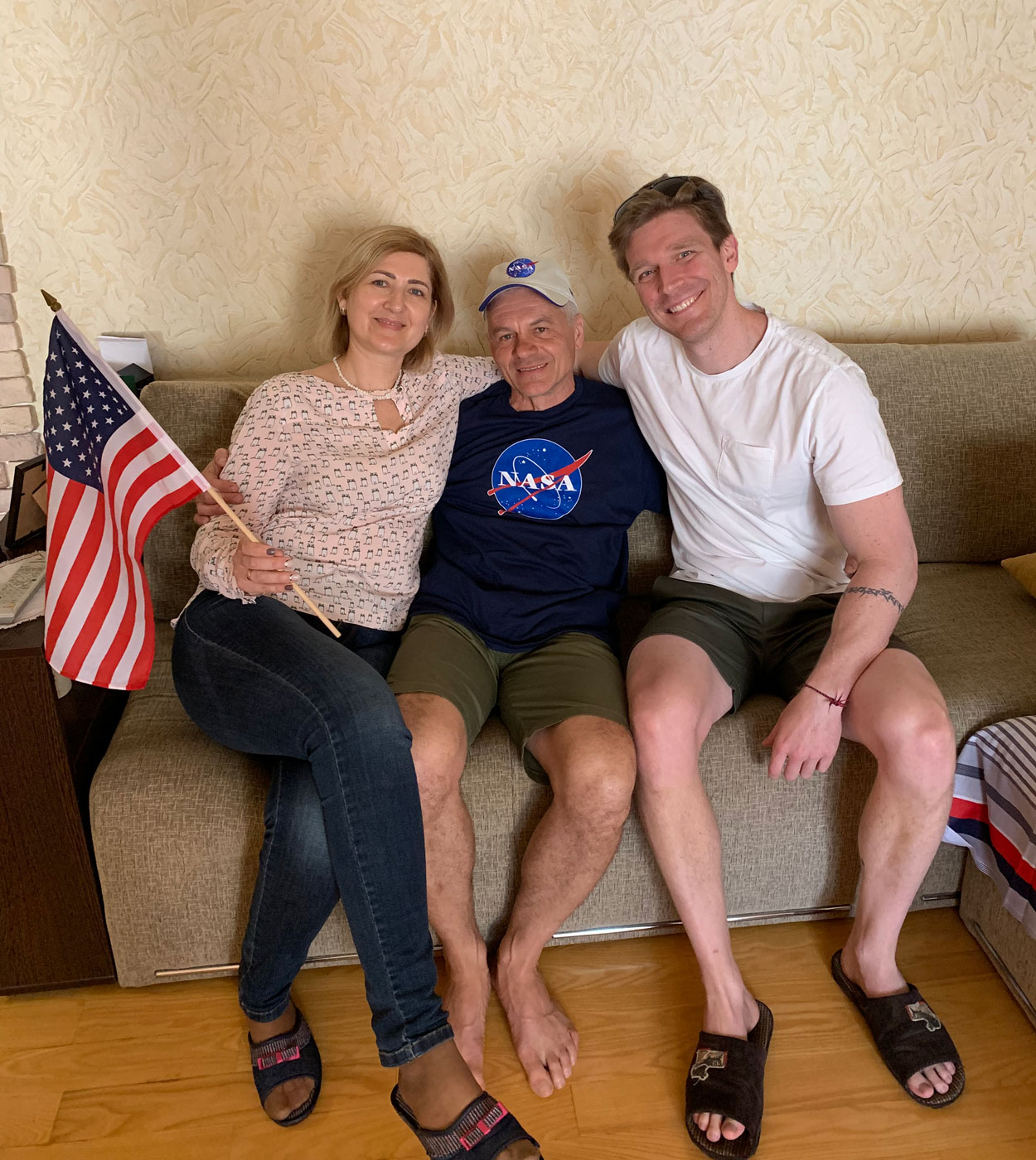
‘We Were Very Afraid’
In April 1986, Sergiy and his brother were on an overnight train headed home to Komsomolsk from Kyiv, when, unknown to them at that moment, an explosion ripped through reactor No. 4 at the Chernobyl nuclear power plant.
Valeriy, then a Red Army warrant officer posted to East Germany, was on leave and had just spent a few days visiting Sergiy in Kyiv. The brothers were headed home for what was supposed to be a joyous family reunion. Instead, once at their parents’ home in Komsomolsk, they listened in dismay to a Voice of America radio broadcast about the unfolding nuclear disaster at Chernobyl.
“All the Soviet TV and radio stations said that everything was OK, that it was no big deal,” Valeriy recalls. “When we learned the truth, we were very afraid.”
The Chernobyl plant is located only about 60 miles north of Kyiv. However, on May 1, 1986, just days after the nuclear disaster, the International Workers’ Day parade went ahead as planned in Ukraine’s capital city.
The Kremlin evidently was more concerned with keeping up appearances than dealing with reality. And so on that clear spring day, tens of thousands of people lined Kyiv’s roads, totally unaware of the radioactive fallout invisibly descending upon them. Decades later, film shot during the parade sparkles and flashes—evidence of radioactive particles on the celluloid.
Sergiy, for his part, was unsure about returning to Kyiv in the wake of the Chernobyl disaster. His time in Afghanistan had revealed to him the extent of the Kremlin’s propaganda lies, and he feared the truth about Chernobyl was much worse than what officials were letting on in the news.
The reborn optimism and happiness Sergiy had felt upon his arrival in Kyiv a year earlier quickly gave way to feelings remembered from the war—dark feelings, which he’d hoped to forget forever.
“When I was in Afghanistan, I always felt like death was chasing me,” Sergiy remembers, adding:
And when I came back to Ukraine, I thought I could be free from that fixation on death. But Chernobyl happened, and here death finally caught me. A long and painful death. I remember, I said to myself, ‘How ironic, death didn’t catch me in the war, but it did in civilian life.’
At the behest of his parents, Sergiy decided to return to Kyiv and finish his law degree. He’d been dating a woman and was looking forward to settling down in the city, possibly starting a family.
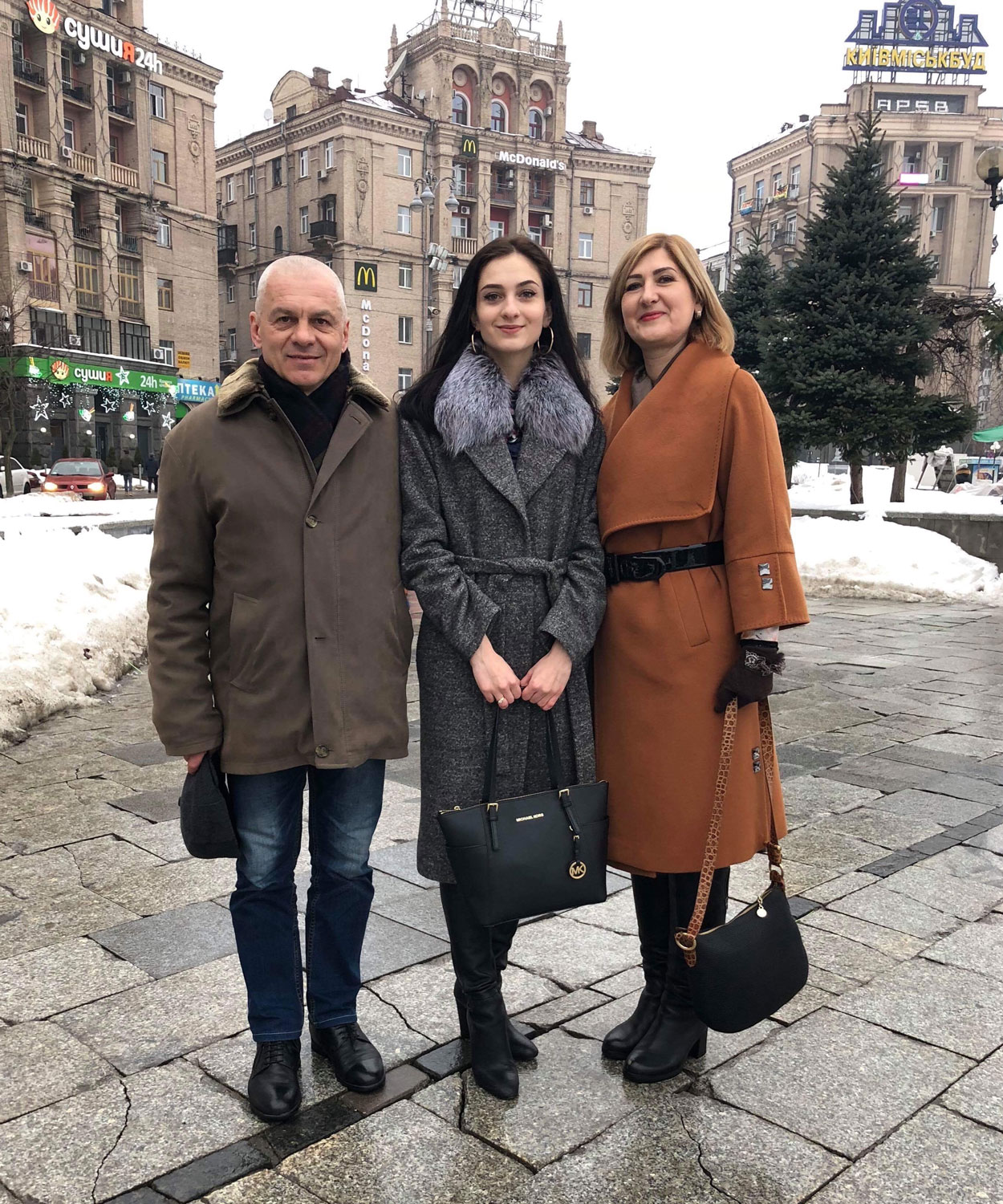
‘Like a Scythe’
Yet, as time went on, Sergiy began to understand incrementally the full extent of the Chernobyl nightmare. He was horrified by photos of mutated human babies and animals. And rumors circulated throughout Kyiv about a spike in lung cancer.
“I told myself I need to escape this, I have to get far away,” Sergiy says.
And that’s what he did.
After graduating from law school in 1991, Sergiy broke up with his girlfriend and returned to Komsomolsk, now called Horishni Plavni and roughly 190 miles southeast of Kyiv. In short order, the Soviet Union’s disintegration that year further upended his world.
When the economy subsequently collapsed, he ultimately abandoned his law career and took up work as a hired hand. It was his only option to make a living.
For years, my uncle-in-law, who is a devoutly religious man, has struggled with his demons from Afghanistan. His family life has had its ups and downs—so has his country. Since the chaos of the 1990s, Ukraine has gone through revolutions and a war to free itself finally from Russian overlordship.
Through it all, Sergiy never once returned to Kyiv. Partly, due to lingering fears about radiation from Chernobyl. Although there was another reason, too, which is more difficult to articulate.
You see, Kyiv is the place where Sergiy’s youthful idealism, which had survived the war in Afghanistan, finally came to an end. Thus, traveling back to the capital city inevitably would make him confront the question: “What could have been?”
“I was fantasizing about staying in Kyiv after university, but Chernobyl ruined it all,” Sergiy says. “Like a scythe it cut down all my dreams. I was furious at our government for being so negligent and indifferent. For always lying.”
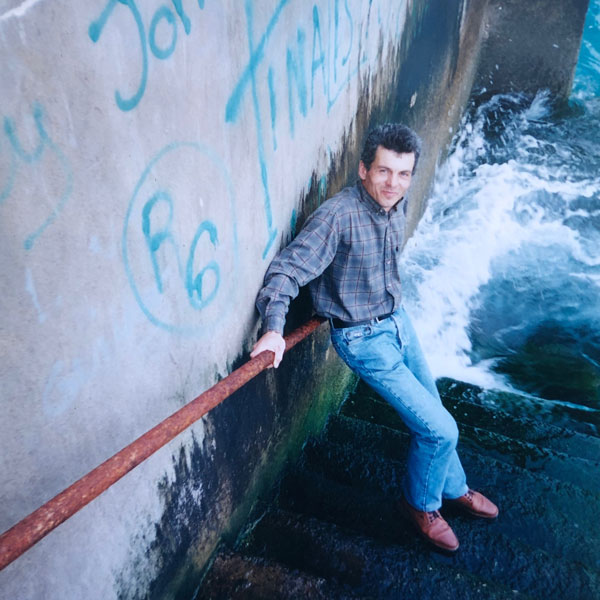
Defiance
Valeriy never served in Afghanistan. He was posted instead to East Germany and worked in signals intelligence, a specialty that paved the way for his future civilian career as a German language interpreter. He speaks English quite well, too.
During Ukraine’s lean, post-Soviet years, Valeriy and his wife Olena went to great lengths to provide for their daughter, Lilya. Sometimes, as my wife recalls, her parents would forgo food to afford the most basic of school supplies. Pencils, notebooks—stuff like that.
“My parents sacrificed everything for me,” Lilya remembers. “The times were tough, but I never really knew it. My parents gave me the perfect childhood.”
At that time, they all lived in a one-bedroom apartment in a Soviet-era Khrushchyovka—the colloquial name for the drab, cubical apartment buildings that sprung up like weeds during the reign of Soviet Premier Nikita Khrushchev.
When she was 4, Lilya tearfully told her parents that she wanted her own room. Overcome with a sense of guilt for his perceived inability to provide for his family, Valeriy resolved to do whatever it took to give them a better life. So, he left to work in Portugal for two years as a construction worker.
Lilya recalls how her father sometimes mailed items of clothing home as gifts. After a while, however, the sizes he chose for her were, without fail, much too small. He simply didn’t understand how much his daughter, his only child, had grown in the time he was away.
When he returned home at last, Valeriy had saved up enough money to buy his family a two-bedroom apartment. And the first thing he bought to furnish their new home was a brand new Pioneer stereo system.
These days, when Lilly and I come to visit, we often sit around with her parents until late at night, listening to classic rock albums on that stereo. As the night wears on, Valeriy will typically close his eyes, smile, and rock his head to the music he loves so much.
“I love rock music,” Valeriy explains. “There’s just something special about it.”
‘Still Lovin’ You’
As the lights dimmed and the guitar riffs of Scorpions’ rock ballads shook the air around them, the two Deriy brothers were transported back to their youth. To a time when their love of rock ’n’ roll was a means to furtively express their irrepressible urge for freedom, which the Soviet state had tried in vain to suppress.
“Emotions were running high, because the sound was very loud—the wind from the first chords almost took my shirt off,” Valeriy jubilantly says of the Scorpions show. “It connected with our youth. It brought back good memories, as well as memories of all the restrictions during those years, when we could only listen to records that were smuggled into the country.”
“First, there was the feeling of youth coming back. So many memories,” Sergiy adds. “Then came the realization of how differently we understand the music now than we did before. It’s a more mature understanding, and a conviction about how immortal all those songs are.”
In their country’s capital city and in the open, the Deriy brothers could fully and without abandon give in to the music, go wild, and rock their hearts out. As the guitars snarled and the drumbeats rattled their bones, both men experienced pure, unfettered happiness. Freedom.
“Growing up, we never saw our favorite bands’ performances, or their shows,” Valeriy tells me over Thanksgiving, a few weeks after the Scorpions concert, adding:
Only after the Soviet Union collapsed could we go on Google and watch them in concert, or read news about their lives. And so now we were watching them live! It was Scorpions’ last tour, and my brother and I are not so young anymore. So it was very emotional. We even teared up a little.
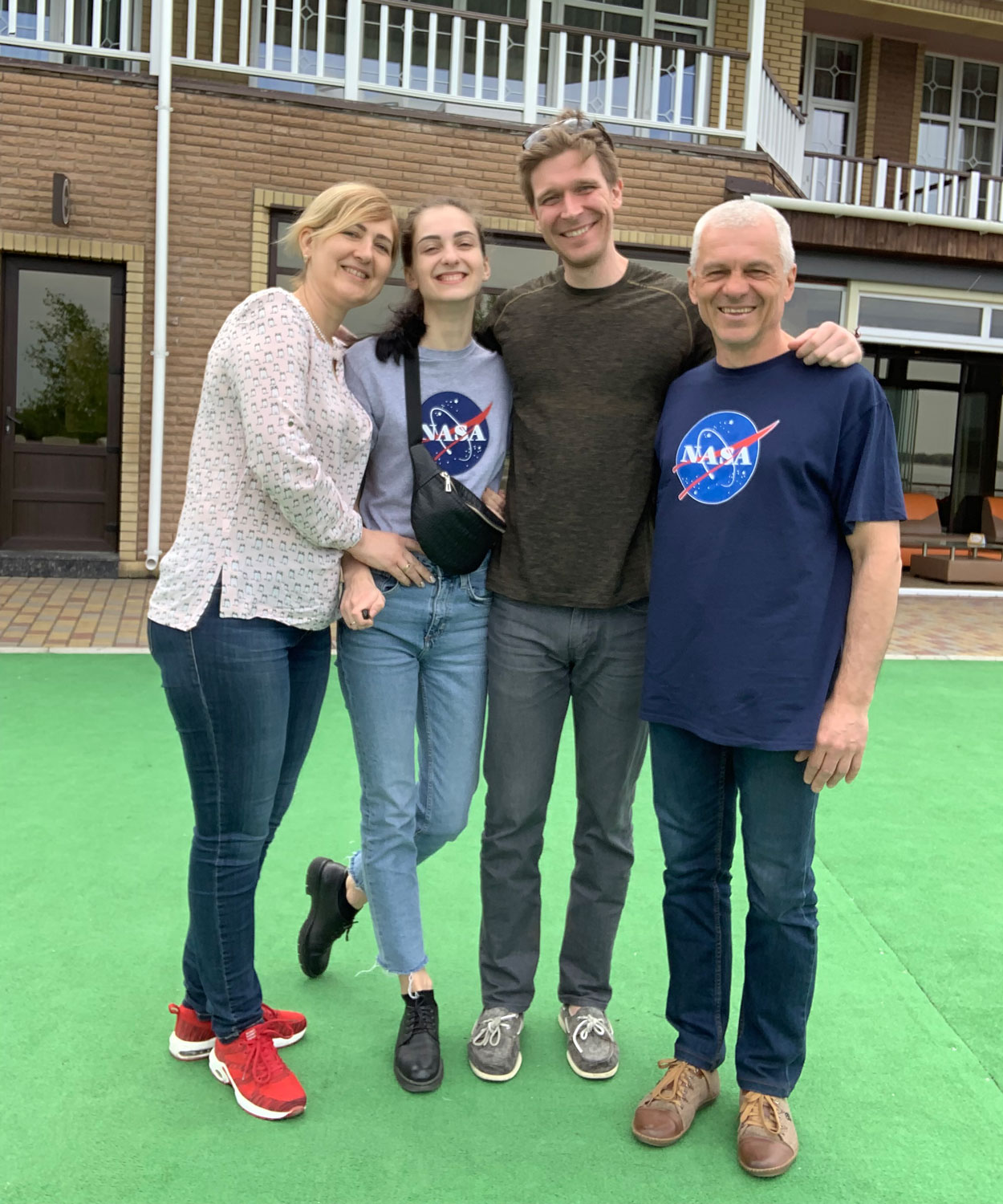
The ‘Wall’
The Deriy brothers have seen a lot of changes in their lives.
As young men, they were indoctrinated by Soviet propaganda to believe that America was their mortal enemy.
“Back then, there was the so-called wall between us and the Western world—like the Pink Floyd song,” Valeriy says.
Yet, as older men, they’ve both shown the remarkable moral courage to abandon their former worldviews and embrace a new truth. Valeriy and Sergiy now believe in the justice of freedom and democracy, rather than conformity and communism.
The two Red Army veterans wholeheartedly believe that the United States is a force for good and a beacon of hope for freedom-loving people around the world. Without hesitation, they’ve welcomed me, an American military veteran, into their family with open arms.
A generation ago, these two men would have been my enemies. Our countries were poised at opposite ends of the earth, ready to unleash nuclear Armageddon to destroy one another.
Today, we are a family.
Life sure hasn’t been easy for those Ukrainians who’ve lived through the end of communism and the painful birth of their country’s democracy. Those generations have reckoned with the Soviet Union’s lies, endured an economic collapse, and survived revolutions and war.
In spite of it all, however, Valeriy and Sergiy remain unbroken.
They still extoll the justice of their country’s path, no matter its attendant hardships. All the tough times, and all their personal trials, were not in vain, they steadfastly believe. Because, in the end, they’d rather struggle as free men than ever return to the kind of predictably stable oppression they endured in the Soviet Union.
Freedom, after all, usually means more to people who’ve experienced the alternative.
“I’m trying to stay positive despite of everything that’s going on,” Sergiy says. “It would be so wrong not to believe in our future. I always have hope. It’s just a matter of time … our future generations will be truly happy and free.”
“When I was young, I was living behind barbed wire and brick walls,” his brother Valeriy adds. “All these years later, we’re still fighting for our freedom. But I am very proud of our country. And I hope that my daughter and my grandchildren will see an amazing, free Ukraine.”
I often have equated Ukrainians’ fight for freedom to their pursuit of the American dream. Yet, that’s not exactly true.
The yearning for freedom transcends America, underscoring a universal truth about the human spirit. In that way, freedom sure sounds a lot like rock ’n’ roll.
The band Kiss, covering a 1973 hit by rock predecessors Argent, sang in 1991:
God gave rock and roll to you
Gave rock and roll to you
Put it in the soul of everyone.
































